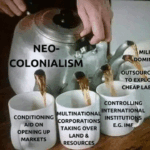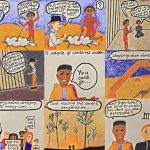by Jakob Drews
The global capitalist system is characterized by inequality through exploitation and dependency. These attributes were fostered by European colonization. Different parameters of dependency were institutionalized since the “independence” of the formally colonized. They characterize the structure of the international system. Some economies are profiting from the global capitalist system, some are doomed to depend on those who profit. This structure is binary and consists of the profiting centre and the exploited periphery. Both substructures were not “born” into their respective position. They were constructed. In this work, I am stressing the relationship between centre and periphery from a historical perspective. What constituted the centre in the centre and why is the periphery dependent on the centre?
Tag: Exploitation of Natural Resources
Private Security Companies in the extractivist industry in Africa
by Konstantin von Kleist-Retzow
Private Security Companies perform services that are integral to maintaining extractivism. Consequently, this work claims that PSCs safeguard neocolonial extractivist practices in Africa and thereby reproduce and intensify global power imbalances in political, economic, and social terms…
Glossary of the Institutionalized Regime of Underdevelopment
by Lisanna Kelz, Aikaterini Mouzaki, Zanê Aradine and Isabel Pearce
A Glossary narrating the Institutionalized Regime of Underdevelopment: A critical reflection of the market-oriented international order, reproducing neocolonial exploitation patterns. The glossary is divided into three sections: Institutions; Country Groupings, Unions and Organizations; and Terms of Economic and Financial Governance…
Comic Strip “WHO KNOWS?”
by Tania Plunkett
While studying the subject, “The Invention of Africa,” which was based on V.Y. Mudimbe’s book of the same name, I was struck by the parallels I see in my own country, Australia, regarding the historical and present-day perceptions of Aboriginal and Torres Strait Islanders (ATSI). During my school years through the 1980s and 90s, schools taught Australian colonial history as “Australian history” and painted colonists largely as explorers and heroes. Indigenous histories were mostly excluded or simplified, and ATSI perspectives almost never included.
The Accumulation of Africa
by Mikael Lyngaas
In this essay I’ll examine capitalist accumulation and imperialism within an African colonial and post-colonial context.
Genocide in the Congo: It’s Time to Listen – A Video Podcast
by Nina Sophie Meyer
Have you ever asked yourself how Congo is the most resourceful country in the world, yet its people are amongst the poorest? “It’s Time To Listen”, sheds some light on the horrors of the continuing exploitation of the African continent, specifically of the DRC and its people. Not only is this topic largely neglected in the mainstream media, the prevailing discourse is having us believe that the struggles of the DRC and its people are neither directly caused by European continent nor actively affect it. This podcast is an attempt to expose some hidden truths, to explain who is concealing them and why.





